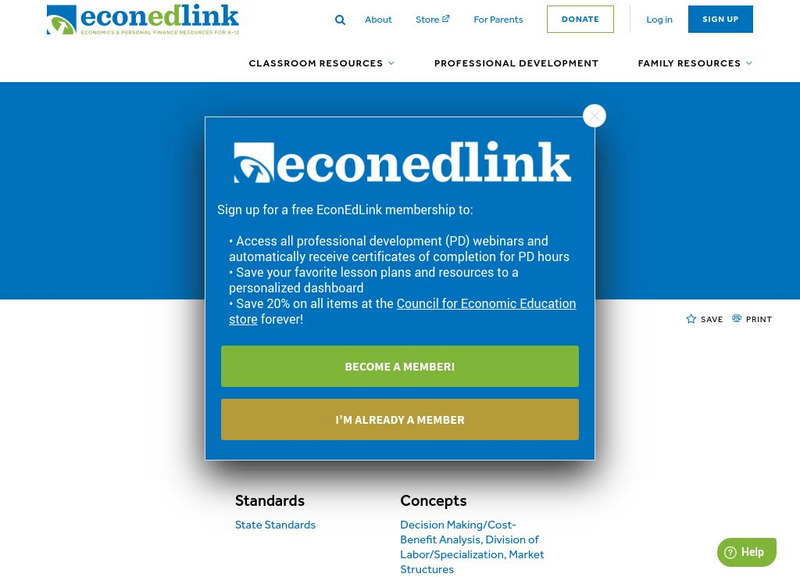Curated OER
The Berenstain Bears Don't Pollute (Anymore)
Students listen to the story, The Berenstain Bears Don't Pollute (Anymore). They create a Venn Diagram comparing it with the story, The Lorax. Then students plan ways to become advocates for recycling.
Curated OER
Handling the Earth with Care
Eighth graders examine the characteristics of caring people. In this behavioral studies lesson, 8th graders differentiate between caring and uncaring personality traits. Students view a video about personality traits, and...
Council for Economic Education
Green Eggs and ...Economics?
Scholars use four different children's books by Dr. Seuss to analyze microeconomic concepts. Group presentations and research help them better understand simple economic concepts through simple stories.
Curated OER
A Tree-mendous Project
Seventh graders use their observation and measurement skills to identify trees. Using a tree diagram, they label the parts and discuss the functions of the tree. They practice using a dichotomous key to identify trees as well.
Curated OER
Economics -- Third Grade
Third graders read the Dr. Seuss book The Lorax. In groups, they answer questions that are related to economics and distribution of goods. They also identify the environmental issues present in the book and perform a skit in front of the...
Curated OER
Respecting Diversity
Middle schoolers explore the concept of philanthropy. In this service learning lesson, students read and respond to The Sneetches by Dr. Seuss. Middle schoolers discuss self-respect and respect.
Curated OER
Deforestation
Students study the effects of deforestation. In this environmental lesson, students view a PowerPoint slideshow about the importance of trees. Students read The Lorax and discuss what the characters represent in our society.
Curated OER
Be Kind to our Earth
Learners make a list of ideas on ways we can take care of our Earth and complete a class project planning sheet where they problem solve to help save the Earth. In this Earth lesson plan, students also play a conservation charades game.
Curated OER
Land Use Unit
Students identify factors in human society and the natural environment aree interdependent. They analyze interdependencies demonstrated in various situations and occurances.
Curated OER
Environment and Recycling Issues
First graders read and understand the text found while conducting internet research. They recognize how literature records information and reflects the human experience. Students also compare and contrast answers to questions. Then...
Curated OER
Concern + Action = Clean Air Solutions
Students participate in a service project about improving air quality. In this air quality lesson, students understand the problems and solutions for improvement of air quality issues. Students discuss and choose an air quality service...
Curated OER
Allegory and Dr Seuss
Tenth graders read Dr. Seuss books to discover what allegory is. They investigate how Dr. Seuss studenT books are allegories of events in the real world and create timeline
Curated OER
Halloween Candy Sort
Young scholars use their Halloween candy to practice sorting and classifying. They compete a Venn diagram comparing their candy wrappers. They develop ways as a class to catorgize the candy in different ways.
Curated OER
Needs and Wants
Students examine the difference between needs and wants. For this consumption lesson, students illustrate their needs and wants and discuss their own reasons for buying things. They also discuss the connection between their choices and...
Curated OER
Our Treasured Trees
Students discuss natural resources and renewable resources with trees being considered renewable resources which need special attention. In this Earth science lesson plan, students write a list of reasons for why it would be good to stop...
Curated OER
Tree Friends
Students are introduced to tree structure and use. They identify their special tree using all senses except sight. Students identify six different internal parts within a cross section of tree trunk (bark, phloem, xylem, cambium,...
Council for Economic Education
Econ Ed Link: Green Eggs and Economics?
Economic concepts are often found in places students have never considered, like children's literature. In this instructional activity, students will explore the various economic concepts addressed in five of Dr. Seuss' most popular...
ReadWriteThink
Read Write Think: Using Picture Books to Teach Plot Development and Confict Res.
Students read picture books to explore the concepts of plot development and conflict resolution. They first learn about the connections between reading and writing, and then revise their own writing. CCSS.ELA-Literacy.CCRA.R.4

















